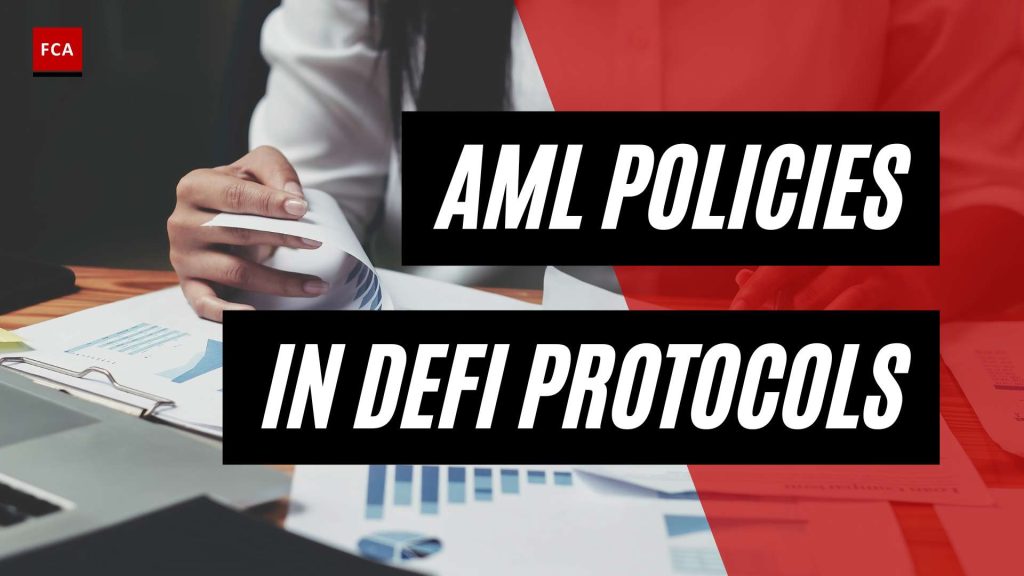Understanding AML in Decentralized Finance (DeFi)
Decentralized Finance (DeFi) has gained significant popularity in recent years, providing innovative financial solutions through blockchain technology. However, the decentralized nature of these platforms has raised concerns regarding anti-money laundering (AML) compliance. In this section, we will explore AML policies for DeFi protocols, the compliance challenges they face, and the regulatory frameworks designed to address AML in the DeFi space.
AML Policies for DeFi Protocols
DeFi platforms have been increasingly scrutinized for their potential vulnerabilities to money laundering and terrorist financing due to the anonymity and lack of centralized oversight they offer. To combat these risks, DeFi protocols are advised to implement AML measures that align with established regulatory standards. These measures include, but are not limited to:
-
Know Your Customer (KYC) Procedures: KYC procedures involve verifying the identities of users by collecting relevant information such as government-issued identification documents and proof of address. By implementing robust KYC processes, DeFi platforms can enhance their ability to detect and deter illicit activities (ACAMS).
-
Transaction Monitoring and Suspicious Activity Reporting: Transaction monitoring involves the systematic review and analysis of transactions to identify any unusual or suspicious patterns. By implementing effective transaction monitoring systems, DeFi platforms can identify potentially illicit activities and promptly report them as required by regulatory obligations.
-
Sanctions Screening: DeFi protocols should implement sanctions screening processes to ensure compliance with international sanctions lists. This helps prevent individuals or entities on sanctions lists from utilizing the platform for illicit financial activities.
Compliance Challenges in DeFi
DeFi platforms face unique compliance challenges due to their decentralized and borderless nature. The absence of a central authority makes it difficult to enforce traditional AML policies and regulations. Additionally, the pseudonymous nature of blockchain transactions can make it challenging to identify the true identities of users involved in financial activities on these platforms. These challenges require innovative solutions and regulatory adaptations to effectively address AML risks in the DeFi space.
Regulatory Frameworks for AML in DeFi
Recognizing the need to address AML concerns in the DeFi ecosystem, regulatory frameworks are being developed and implemented in various jurisdictions. Countries such as the United States, Singapore, and Switzerland have taken steps to bring DeFi platforms within the scope of existing AML/CFT (Combating the Financing of Terrorism) laws. These frameworks aim to ensure that DeFi protocols adhere to AML obligations, including customer due diligence, transaction monitoring, and reporting suspicious activities (ACAMS).
The Financial Action Task Force (FATF) has also provided recommendations for AML compliance in the DeFi space. In July 2020, the FATF outlined guidelines emphasizing the importance of implementing the Travel Rule, which requires the exchange of originator and beneficiary information for virtual asset transfers above a certain threshold. These recommendations aim to enhance transparency and traceability within the DeFi ecosystem (ACAMS).
As the DeFi space continues to evolve, regulators and industry participants are actively working together to establish comprehensive AML frameworks that strike a balance between innovation and compliance. International cooperation and standardized regulatory approaches are crucial to effectively mitigate money laundering and terrorist financing risks within DeFi ecosystems (U.S. Department of the Treasury). By addressing these challenges and establishing robust AML frameworks, the DeFi industry can foster trust, integrity, and long-term sustainability.
Implementing AML Measures in DeFi
In order to ensure compliance with AML regulations in DeFi and mitigate the risk of money laundering and other illicit activities, it is crucial for DeFi protocols to implement robust AML measures. Let’s explore three key measures that can be employed:
Know Your Customer (KYC) Procedures
Implementing effective Know Your Customer (KYC) procedures is a fundamental step in AML compliance for DeFi protocols. KYC procedures involve verifying the identity of users and collecting relevant information to assess the potential risks associated with their activities. By conducting thorough KYC checks, DeFi platforms can identify and mitigate the risk of illicit actors accessing their services.
KYC procedures typically involve collecting identification documents, such as passports or driver’s licenses, as well as conducting identity verification checks through reliable sources. Furthermore, ongoing monitoring of customer activities can help detect suspicious patterns that may indicate potential money laundering or other fraudulent activities.
By adhering to rigorous KYC procedures, DeFi protocols can create a more transparent and secure environment, building trust among users and regulators alike.
Transaction Monitoring and Suspicious Activity Reporting
Transaction monitoring plays a crucial role in detecting and preventing money laundering in DeFi. By implementing robust transaction monitoring systems, DeFi platforms can analyze user activities, identify unusual patterns, and flag potentially suspicious transactions for further investigation.
Automated transaction monitoring tools can be utilized to analyze large volumes of transactions in real-time, enabling the detection of complex money laundering schemes. These systems can flag transactions that exhibit characteristics such as high-value transfers, rapid movement of funds, or frequent transfers to high-risk jurisdictions.
When suspicious activity is detected, DeFi protocols should have mechanisms in place to report these activities to the appropriate authorities. Timely reporting of suspicious transactions is a crucial step in combating money laundering and ensuring compliance with AML regulations.
Sanctions Screening in DeFi
Sanctions screening is another important aspect of AML measures in DeFi. It involves checking user details and transactional data against global sanctions lists to ensure compliance with international sanctions regimes. By screening for sanctioned individuals, entities, or jurisdictions, DeFi protocols can prevent their platforms from being used for illicit purposes.
Sanctions screening can be achieved through the use of advanced technology and databases that provide up-to-date sanctions information. Automated screening processes can efficiently compare user information against sanctions lists, minimizing the risk of human error.
Implementing sanctions screening measures not only helps DeFi platforms comply with international regulations but also contributes to the broader global efforts to combat money laundering, terrorist financing, and other illicit activities.
By implementing robust KYC procedures, transaction monitoring systems, and sanctions screening measures, DeFi protocols can enhance their AML compliance efforts and contribute to a safer and more secure decentralized financial ecosystem. These measures, combined with AML procedures in DeFi transactions, AML audits in decentralized finance, and the use of AML tools for decentralized finance, play a vital role in maintaining the integrity of the DeFi space and protecting it from abuse.
The Role of the Financial Action Task Force (FATF)
In the realm of AML compliance, the Financial Action Task Force (FATF) plays a significant role in shaping regulations and guidelines. The FATF is an intergovernmental organization that sets international standards and promotes the implementation of measures to combat money laundering, terrorist financing, and other illicit activities.
FATF Recommendations for DeFi AML Compliance
In July 2020, the FATF issued recommendations for the application of AML (anti-money laundering), CFT (combating the financing of terrorism), and proliferation financing requirements to DeFi-related activities. The guidance emphasizes the need for DeFi platforms to implement the Travel Rule, which requires the exchange of originator and beneficiary information for virtual asset transfers above a certain threshold (ACAMS).
These recommendations highlight the importance of proper Know Your Customer (KYC) procedures and ongoing monitoring to mitigate money laundering and terrorist financing risks associated with DeFi platforms. By implementing robust AML measures, DeFi protocols can enhance transparency and reduce the potential misuse of their platforms for illicit purposes.
Travel Rule and Originator-Beneficiary Information
The Travel Rule, a key component of the FATF recommendations, aims to address the challenges of anonymity and traceability in virtual asset transfers. It requires virtual asset service providers, including those operating DeFi platforms, to exchange originator and beneficiary information when conducting transactions above a specified threshold.
By adhering to the Travel Rule, DeFi platforms can facilitate the sharing of essential information necessary for AML investigations and enhance the ability to detect and prevent illicit activities. This increased transparency can help in tracking funds, identifying potential money laundering schemes, and strengthening global efforts to combat financial crimes.
Jurisdictional Approaches to AML in DeFi
As the popularity of DeFi continues to grow, regulators and jurisdictions worldwide are taking steps to address AML concerns in this space. Countries like the United States, Singapore, and Switzerland have started implementing regulatory frameworks to bring DeFi platforms within the scope of existing AML/CFT laws.
These jurisdictional approaches aim to ensure that DeFi platforms comply with AML requirements, including KYC procedures, transaction monitoring, and suspicious activity reporting. By subjecting DeFi platforms to AML regulations, authorities seek to prevent money laundering, terrorist financing, and other illicit activities within the decentralized finance ecosystem.
As the FATF continues to provide guidance and recommendations, it is essential for DeFi platforms and stakeholders to stay abreast of evolving AML regulations and adjust their compliance measures accordingly. By adopting a proactive approach and collaborating with regulators, the DeFi community can help foster a safe and secure environment for users while combating financial crimes effectively.
Addressing AML Risks in DeFi
As the decentralized finance (DeFi) space continues to expand, addressing anti-money laundering (AML) risks becomes increasingly important. To effectively combat money laundering and illicit activities within DeFi ecosystems, a risk-based approach to AML compliance, collaboration and international cooperation, and extending AML regulations to DeFi ecosystems are key considerations.
Risk-Based Approach to AML Compliance
Implementing a risk-based approach is crucial for AML compliance in the DeFi space. This approach involves conducting risk assessments to identify and prioritize potential AML risks associated with specific DeFi protocols and transactions. By understanding the inherent risks, compliance officers can tailor their AML measures accordingly, allocating resources where they are most needed.
The risk-based approach includes implementing robust customer due diligence (CDD) procedures, transaction monitoring systems, and suspicious activity reporting mechanisms. It also involves ongoing monitoring and periodic reviews of customer profiles to detect any unusual or suspicious activities. By adopting a risk-based approach, DeFi platforms can enhance their AML compliance efforts while minimizing the impact on legitimate users.
Collaboration and International Cooperation
Addressing AML risks in DeFi requires collaboration between various stakeholders, including DeFi platforms, regulators, financial institutions, and law enforcement agencies. Cooperation and information sharing among these entities are vital to effectively identify and mitigate AML risks within the decentralized ecosystem.
Collaboration can involve sharing best practices, insights, and emerging trends in AML compliance within the DeFi space. It can also include the development of common standards and frameworks to ensure consistency and effectiveness in AML measures across different jurisdictions.
International cooperation is particularly crucial due to the cross-border nature of DeFi activities and the potential for money laundering across multiple jurisdictions. By working together, regulators and industry participants can establish a coordinated approach to combat AML risks in DeFi and foster a safer and more secure environment.
Extending AML Regulations to DeFi Ecosystems
To effectively address AML risks in DeFi, it is important to extend AML regulations to cover DeFi ecosystems. Regulators need to adapt existing AML frameworks to encompass DeFi activities and provide clear guidelines for compliance. This includes clarifying the obligations of DeFi platforms and participants, such as decentralized exchanges, liquidity providers, and lending platforms, in implementing AML measures.
Extending AML regulations to DeFi ecosystems involves establishing requirements for customer identification, transaction monitoring, and reporting suspicious activities. It may also involve introducing regulatory oversight and audits to ensure compliance with AML obligations.
By aligning AML regulations with the unique characteristics of DeFi, such as the use of smart contracts and blockchain technology, regulators can strike a balance between fostering innovation and maintaining the integrity of the financial system.
Addressing AML risks in DeFi requires a comprehensive and collaborative approach. By adopting a risk-based approach to AML compliance, promoting collaboration and international cooperation, and extending AML regulations to DeFi ecosystems, stakeholders can contribute to the integrity and security of the DeFi space while combating money laundering and illicit activities.









